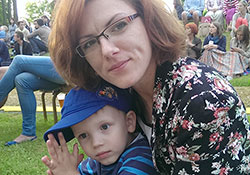Latvia: Kristīne Volkoviča

Kristīne Volkoviča
Health experience related to: rotavirus infection
Listening carefully to patients and working with them as partners in their care, including through telephonic case management, enable professionals to provide the right services at the right time.
On the day before a national holiday, my four-year-old son started showing symptoms of an infectious disease. At first we did not call for help, but the situation was not getting better; we called the hospital and were told to go there immediately. We live nearby so we drove down with our own car, because we thought ambulances should be called only when they are really needed to save lives.
Once we arrived, we waited no more than 5 minutes to be seen and the doctor on duty quickly diagnosed rotavirus. He took us to the ward and filled out all the necessary admission forms.
The nurses were responsive, accurate and caring. The most upsetting thing for us as parents was the need to connect an intravenous system to our child's arm and to give him injections. In these situations parents need to stay calm, but it is not an easy task. So the nurse made up a story to tell my son, which made the treatment more pleasant for him.
It is very important to communicate clearly when one is in need of medical assistance. That means asking questions when you don't understand something and being prepared to explain what is bothering you. The treating doctor cannot know how well informed the patient is or what scares him or her the most. And the patient does not know what kind of procedures will be carried out in the course of treatment. If the patient asks questions in sufficient detail, then the doctor would answer them in a similar way. If the patient sits, waits and does not explain anything or does not asks questions, then the doctor may not know how to give the best care to that particular person.
Our family doctor is always available when we need her. If she does not answer her phone when I call, it's because she is advising other patients and then we communicate through text messages. I write a short message describing the situation, and if it is not too serious, she gives us directions on what to do over the phone. Once she gave us advice at 06:00. If the parent falls into despair and does not know how to handle a particular situation with a sick child, it is good to have someone to turn to.
I recommend to all people when they go to a hospital to do so ready to communicate openly, to explain their situation and to ask questions. This promotes a healthy collaboration between the patient, their family members and the treating physician. In order to receive good care after first aid is given, cooperation should be developed with the attending physician as well as medical staff. The health care staff should continuously inform patients and their relatives about the course of treatment and specific procedures that would be done to them.
I wish good luck to everybody and less sickness!



